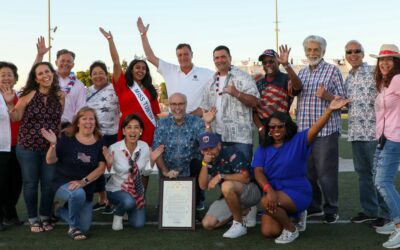
Read the full Orange County Register article online here.
By THERESA WALKER / STAFF WRITER
Military veterans tend to mistrust promises.
Being associated with veterans is good marketing, and veterans note that over the years everybody from private business owners to social advocates to politicians have made big claims of help for veterans that eventually fell flat. Post-9/11 veterans are especially disengaged.
But several new local programs and ideas – touching everything from housing to jobs to mental health – could give local veterans reason for optimism.
Some of the action is a response to a February in-depth survey on the struggles of former service members here, undertaken by USC researchers at the behest of Orange County Community Foundation.
Other efforts are rooted in long-term work of veterans advocates and a renewed commitment of public agencies tasked with providing veteran services, particularly from the much-criticized U.S. Department of Veterans Affairs.
Underlying it all is a recent infusion of money from private donors, philanthropic groups and government agencies.
JOBS, JOBS, JOBS
To see the new push for veterans play out in real life, look no further than the Tustin blimp hangars today through Sunday, where veterans will receive access to a variety of services in one place.
The idea isn’t new.
Launched in 2011 by the nonprofit Veterans First, the annual Orange County Stand Down event focuses on homeless veterans, letting them bed down in makeshift barracks and get access to everything from haircuts to flu shots. Several hundred typically attend.
But this year, the outreach has a new name – Orange County Stand Down & Veterans Resources Expo – reflecting a more expansive vision of how, and whom, to help.
Added to the 2015 version – employers.
This year’s organizers, Orange County Rescue Mission and Working Wardrobes, opened the event to all veterans and their spouses by addinga career expo on Saturday. And they shifted the location to the blimp hangars, anticipating a big crowd. As many as 1,500 veterans are expected to fill out applications and sit for on-site interviews with about 100 businesses.
“We have a lot of veterans in Orange County that are either unemployed or underemployed,” said Joshua Wafer, who in June took on the role of Veterans Job Developer for Working Wardrobes, a nonprofit focused on workforce readiness.
“We want to make sure we are adding a service to that population.”
HEALTH ACCESS
Gaining the trust of veterans is a challenge, even for other veterans.
“There are a lot of companies that are just trying to make a buck off of vets,” said Jeff Andrade, a 33-year-old Marine Corps veteran who is an outreach counselor at the South Orange County Vet Center in Mission Viejo.
“Unfortunately, we have to weed through it.”
It doesn’t help when government agencies charged with caring for veterans fail them in ways that have endangered their lives.
Andrade is well aware of the troubles at the scandal-ridden medical centers run by Veterans Affairs. That’s his employer.
Andrade works at one of two VA community offshoots in Orange County where resources include free readjustment counseling for combat veterans. The staff of mostly veterans at the centers (the other is in Garden Grove) can lend a more personal touch that cuts through government bureaucracy.
“It’s hard to get guys to come through the door, but when they do, they’re so thankful,” Andrade said.
“We’re probably the best-kept secret of the VA.”
Last month, in an effort to improve its outreach, the VA held several forums to discuss mental health services, housing, employment and education with local policymakers, nonprofits, landlords, employers and community advocates.
Also, since August, the VA has dispatched a mental health clinician that veterans can see at Huntington Beach Central Library on Fridays.
Andrade and others from his office will be at the Stand Down event, along with a mobile van to hold private counseling sessions.
“I know there are tons of resources and services out there for veterans,” Andrade said.
“The problem is connecting them to it.”
WHERE TO GO
Orange County Community Foundation distributed $500,000 last week to seven nonprofits whose services include peer “navigators” who steer veterans along the way in civilian society, assessment and referral, career counseling, and family support.
The foundation recognizes the need to simplify and publicize the network of assistance for veterans, making it easier for vets to get help once they leave the military.
“These veterans don’t know where to go,” OCCF president Shelley Hoss said. “They don’t know what exists.”
That was true for Joshua Banks, who spent five years as a stateside administrator for an infantry unit and foundered – even spending time on the streets – after leaving the Marine Corps in 2012.
“I just wasn’t ready,” said Banks, 26, who didn’t find much use for the information provided by the military in transition classes at the end of his service – a refrain echoed in the Orange County veterans study.
“I got out not knowing anything and I was homeless. It was really rocky.”
Banks went directly from housing at Camp Pendleton to sleeping in his car or on a friend’s couch his first five months as a civilian. Then ex-military buddies inspired him to enroll at Irvine Valley College and tap his GI benefits.
Banks hopes to become a paralegal. He is president of the veterans club on his campus, where about 850 former service members are among the 14,000 students.
Banks also works as a projects specialist under the guidance of Nancy Montgomery, a registered nurse who is Irvine Valley College’s director of health, wellness and veterans. Montgomery has worked with veterans for about nine years, seven of them in a similar role at Cerritos College.
She has used grant money and arm twisting to bring counseling, health care and other services directly to the veterans on campus.
“You have to come out to them because our veterans do not seek services. If you bring the services to them, they do it.”
POINT OF CONTACT
Orange County Community Foundation awarded Montgomery $75,000 to replicate her program at another Orange County college and measure its success.
The foundation earmarked another $75,000 for 2-1-1 Orange County. By next month, the local clearinghouse for social service resources plans to have a veterans database on its website and staff specially trained to handle their calls.
Leaders at Goodwill Industries of Orange County and 2-1-1 expect to be strategic partners in directing veterans to services in Orange County.
In June, Goodwill received a $1.6 million award from a program funded by the Wounded Warrior Project to establish Goodwill as the county’s leading point of contact for veterans in search of jobs and other resources.
Goodwill already serves about 300 veterans through its Enduring Independence outreach, boosted by a $1 million donation in May from local philanthropists Thomas and Elizabeth Tierney.
Goodwill hopes to assist up to 15,000 veterans over the next five years.
“It isn’t because it may be trendy or a hot topic in the news,” Goodwill of Orange County CEO Frank Talarico said about helping veterans. “We’re going to remain very passionate.”
HOUSING THE HOMELESS

Six years ago, the federal government set a goal of housing all homeless veterans by 2015. That hasn’t happened, but numbers here and nationwide reflect improvement.
An annual count of the homeless in January recorded about 500 veterans living on Orange County’s streets, down from more than 1,200 in 2009. This was true even as the overall homeless population remained about the same.
Federal housing vouchers for veterans have helped, said Scott Larson, chair of the county’s Commission to End Homelessness.
Right now, Orange County has enough vouchers available to cut the current homeless veteran population in half, Larson said. Representatives from the VA will be on hand at the Stand Down event in Tustin to assist in applying for those vouchers.
But there is this growing dilemma: little affordable housing and soaring rents.
Two small-scale projects expected to open next year may help ease the crunch.
The Rescue Mission is converting a pair of rundown fourplexes at Newport and Sycamore avenues in Tustin into a 32-bed housing complexfor veterans. All of the labor is being donated, with completion expected in a few months.
Then there’s the innovative $2.6 million Potter’s Lane project in Midway City. The nonprofit American Family Housing will fashion 16 units from modified steel containers, like the ones on cargo ships.
Plans call for Potter’s Lane, located on Jackson Street in unincorporated county territory, to break ground and open in the spring, said Donna Gallup, president and CEO of American Family Housing.
Half of the so-called micro units are designated for chronically homeless veterans. Subsidized rents will be capped at about 30 percent of an occupant’s income.
Larson, executive director of the building industry charity HomeAid Orange County, said more creative thinking like Potter’s Lane is needed in Orange County.
“If we can do veterans-specific permanent housing projects like this, that’s ideal.”
Contact the writer: 714-796-7793 or twalker@ocregister.com
Strategic Planning, Vision = Success
By providing a clear direction, this visionary process charts the course for the organization and paints a vivid picture of its future achievements. With a firm grasp of the intricacies of strategic planning, I remain committed to driving organizations toward success...


